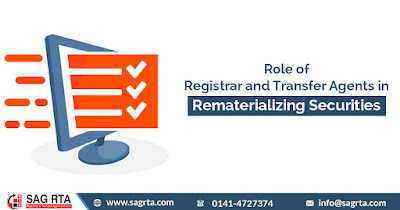Depositories enable individuals to convert their physical share certificates into electronic account balances and vise-versa. Remat is that facility allotted to the investor through which he/she can easily convert his/her electronic security holdings with depositories into physical share certificates. To be noted: Securities requested for rematerialization cannot be traded.
There could be various reasons Remat the securities like hinderance in trading because of trade-locked securities or simply when there is no desire to trade in shares or bonds.
By-Law 9.4: Rematerialisation And Business Rule 11.2: Rematerialisation of securities -are the legal provisions applied in this process.
There could be various reasons Remat the securities like hinderance in trading because of trade-locked securities or simply when there is no desire to trade in shares or bonds.
By-Law 9.4: Rematerialisation And Business Rule 11.2: Rematerialisation of securities -are the legal provisions applied in this process.
Scrutinizing Rematerialization Process
Condition 1 - You have decided to quit dealing in securities but you still have shares in your Demat account. Your Demat account charges you Rs. 500 to Rs. 1000 every year as annual maintenance fees, so to avoid paying maintenance charges in the name of account which you don't actually require, you can rematerialize your electronic securities in physical share certificates.
Condition 2 - Many investors have infrastructure bonds in their Demat accounts, such bonds are trade - locked securities and cannot be touched for at least five years. That means you cannot switch your demat securities from one participant to another before five years. You can choose to rematerialize your trade - locked bonds.
The whole process of rematerialization takes not more than 30 days starting from the day of quoting a request.
Rematirialization of securities is easy via the following steps:
1. Submit a request for Rematerializing your securities:
One needs to apply for rematerializing his/her electronic securities to the DP in which he already has a demat account.
2. DP Verifying the Request:
DP upon receiving the request form from the applicant examines the form to check its accuracy. If the form filled is errorless, it issues the signed and stamped slip of acknowledgment to the applicant. While verifying the request form DP matches the signature of the applicant with the specimen signature in previous records. If the signatures are contrasting then DP does not approve the request.
Read Also:- Know The Ways to Get a Duplicate Share Certificate
Read Also:- Know The Ways to Get a Duplicate Share Certificate
3. DP Transfering Request to NSDL:
DP enters request details in its DPM (software provided by NSDL to the DP), then transfers the request to the issuer of securities or R&T Agent. If the applicant has insufficient balance in his demat account, then the request will get rejected by DP. DP will inform about the same to the client.
4. DPM issuing RRN:
If the applicant fulfills all the pre-set requirements and has sufficient balance in his account, the request will be extended to DPM, DPM in return will issue a Rematerialisation Request Number (RRN) which has to be filled in the rematerialization form.
Read Also:- Process To Remate The Security Holding Under RTA Services
Read Also:- Process To Remate The Security Holding Under RTA Services
5. Further Verifying The RRN Details:
The details in RRN has to be verified by a person other than the person entering the data. Once all the formalities are completed by DP the request reaches the DM, which further is extended to the Issuer or an R & T Agent via electronic modes.
6. Rejection of Request by Issuer or Registrar & Transfer Agent:
Upon receiving the request from DM, Issuer or Registrar & Transfer Agents will process the request. They have the right of rejecting the request and report the objection to DP. they can send an objection memo to DP asking to clarify the objection.
7. Acceptance of Request by Issuer or R&T Agent:
If the Issuer or R&T agent qualify your request for rematerialization will print and further despatch the certificates to the client. Simultaneously sends an electronic confirmation to the DM.
8. Status Update:
The DM downloads this information to the DPM and updates the status of rematerialization request in the DPM. The depository will update the account of the shareholder from which the rematerialized shares will be excluded.
9. Issuing Physical Share Certificates to the clients:
Once the request form is validated and approved by each party, the registrar will issue the physical share certificate to the client.
10. Fees Charged for the Remat Process:
As per the laws mentioned in Depositories Act, the depository cannot impose any stamp duty for transferring the shares when a remat request is made and only a nominal fee is charged for completing the process.

No comments:
Post a Comment